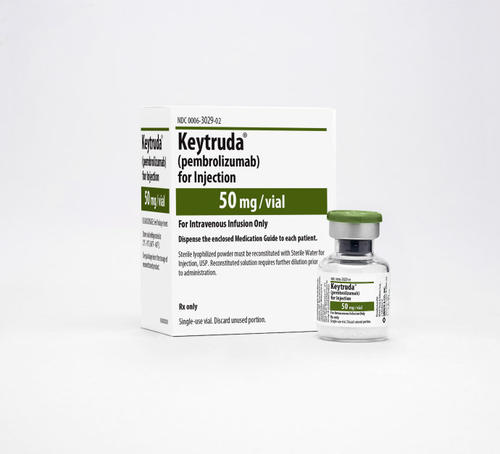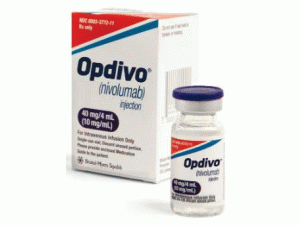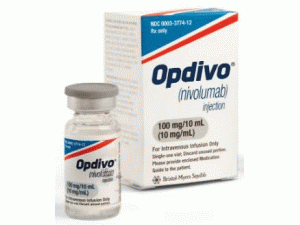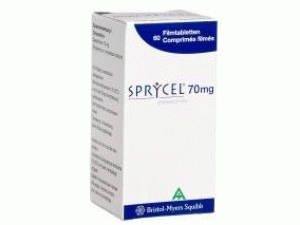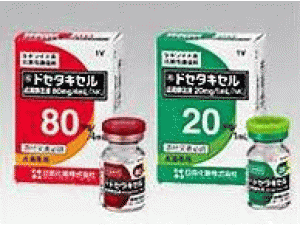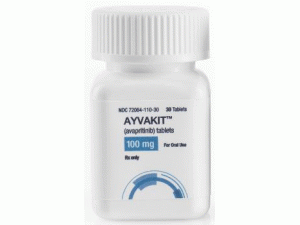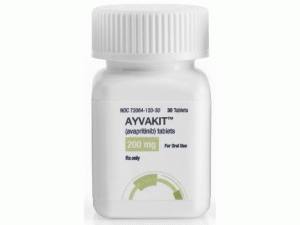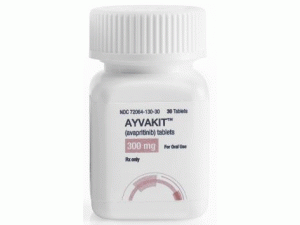阿维鲁单抗冻干粉注射剂Avelumab(Bavencio 200mg/10ml)
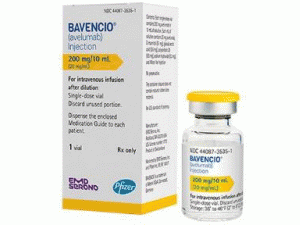 产地国家: 美国
处方药:是
所属类别: 200毫克/10毫升(20毫克/毫升)/瓶
包装规格:200毫克/10毫升(20毫克/毫升)/瓶
计价单位:瓶
生产厂家中文参考译名:默克公司
生产厂家英文名:EMD Serono,Inc
原产地英文商品名:Bavencio injection 200mg/10ml(20mg/nl)/vial
原产地英文药品名:avelumab
中文参考商品译名:Bavencio冻干粉注射剂 200毫克/10毫升(20毫克/毫升)/瓶
中文参考药品译名:Bavencio冻干粉注射剂 200毫克/10毫升(20毫克/毫升)/瓶
产地国家: 美国
处方药:是
所属类别: 200毫克/10毫升(20毫克/毫升)/瓶
包装规格:200毫克/10毫升(20毫克/毫升)/瓶
计价单位:瓶
生产厂家中文参考译名:默克公司
生产厂家英文名:EMD Serono,Inc
原产地英文商品名:Bavencio injection 200mg/10ml(20mg/nl)/vial
原产地英文药品名:avelumab
中文参考商品译名:Bavencio冻干粉注射剂 200毫克/10毫升(20毫克/毫升)/瓶
中文参考药品译名:Bavencio冻干粉注射剂 200毫克/10毫升(20毫克/毫升)/瓶
简介:
近日,美国食品和药物管理局(FDA)扩大批准BAVENCIO(avelumab 中文译名:阿维鲁单抗)冻干粉注射剂用于治疗患有局部晚期或转移性尿路上皮癌的患者,这些患者在含铂化疗期间或之后病情进展,或在12个月内新辅助或辅助的含铂化疗。BAVENCIO(avelumab)的推荐剂量为每2周60分钟静脉滴注10mg/kg。在第一次输注avelumab之前,先用抗组织胺和对乙酰氨基酚进行预处理。批准日期:2017年5月9日 公司:默克公司BAVENCIO(阿维鲁单抗[avelumab])注射液,用于静脉注射美国最初批准:2017年最近的重大变化适用症和用法:2017年5月剂量和用法:10/2018作用机制PD-L1可以在肿瘤细胞和肿瘤浸润性免疫细胞上表达,并且可以有助于抑制肿瘤微环境中的抗肿瘤免疫应答。PD-L1与在T细胞和抗原呈递细胞上发现的PD-1和B7.1受体的结合抑制了细胞毒性T细胞活性,T细胞增殖和细胞因子产生。 Avelumab结合PD-L1并阻断PD-L1与其受体PD-1和B7.1之间的相互作用。这种相互作用释放PD-L1对免疫应答的抑制作用,导致免疫应答的恢复,包括抗肿瘤免疫应答。Avelumab还被证明可在体外诱导抗体依赖性细胞介导的细胞毒性(ADCC)。在同系小鼠肿瘤模型中,阻断PD-L1活性导致肿瘤生长减少。 适应症:BAVENCIO是一种程序性死亡配体-1(PD-L1)阻断抗体,用于治疗•12岁及以上患有转移性Merkel细胞癌(MCC)的成人和儿科患者。基于肿瘤反应率和反应持续时间,在加速批准下批准该适应症。持续批准此指示可能取决于确认试验中的临床效益的验证和描述。•患有局部晚期或转移性尿路上皮癌(UC)的患者:▪在含铂化疗期间或之后有疾病进展。▪使用含铂化疗的新辅助治疗或辅助治疗后12个月内疾病进展。基于肿瘤反应率和反应持续时间,在加速批准下批准该适应症。持续批准此指示可能取决于确认试验中的临床效益的验证和描述。 剂量和给药:预先准备前4次输注,然后根据需要进行。每2周在60分钟内静脉输注800毫克。剂量形式和强度注射:200mg/10mL(20mg/mL)单剂量小瓶中的溶液。 禁忌症:没有。 警告和注意事项: 免疫介导的肺炎:预防中度肺炎,永久停止严重,危及生命或复发性中度肺炎。 免疫介导的肝炎:监测肝功能的变化。扣留中度肝炎;永久停止治疗严重或危及生命的肝炎。 免疫介导的结肠炎:预防中度或重度结肠炎;永久停止危及生命或复发性严重结肠炎。 免疫介导的内分泌疾病:预防严重或危及生命的内分泌疾病。 免疫介导的肾炎和肾功能不全:保留中度或重度肾炎和肾功能不全;永久停止生命危害肾炎或肾功能不全。 输液相关反应:中度或减慢轻度或中度输液相关反应的输注速度。停止输注并永久性地停止BAVENCIO用于严重或危及生命的输液相关反应。 胚胎 - 胎儿毒性:BAVENCIO可导致胎儿伤害。建议对胎儿有潜在风险并使用有效的避孕措施。 不良反应:转移性Merkelcell癌患者最常见的不良反应(≥20%)为疲劳,肌肉骨骼疼痛,腹泻,恶心,输液相关反应,皮疹,食欲减退和外周性水肿。局部晚期转移性尿路上皮癌患者最常见的不良反应(≥20%)为疲劳,输液相关反应,肌肉骨骼疼痛,恶心,食欲减退和尿路感染。 用于特定人群:哺乳期,建议不要母乳喂养。 存储:在36°F至46°F(2°C至8°C)的温度下冷藏,以避免光照。不要冷冻或摇动小瓶。英文版说明书:
dfBAVENCIO(avelumab) injection, for intravenous useIMPORTANT SAFETY INFORMATION and INDICATIONSBAVENCIO can cause immune-mediated pneumonitis, including fatal cases. Monitor patients for signs and symptoms of pneumonitis and eva luate suspected cases with radiographic imaging. Administer corticosteroids for Grade 2 or greater pneumonitis. Withhold BAVENCIO for moderate (Grade 2) and permanently discontinue for severe (Grade 3), life-threatening (Grade 4), or recurrent moderate (Grade 2) pneumonitis. Pneumonitis occurred in 1.2% (21/1738) of patients, including one (0.1%) patient with Grade 5, one (0.1%) with Grade 4, and five (0.3%) with Grade.BAVENCIO can cause immune-mediated hepatitis, including fatal cases. Monitor patients for abnormal liver tests prior to and periodically during treatment. Administer corticosteroids for Grade 2 or greater hepatitis. Withhold BAVENCIO for moderate (Grade 2) immune-mediated hepatitis until resolution and permanently discontinue for severe (Grade 3) or life-threatening (Grade 4) immune-mediated hepatitis. Immune-mediated hepatitis was reported in 0.9% (16/1738) of patients, including two (0.1%) patients with Grade 5, and 11 (0.6%) with Grade.BAVENCIO can cause immune-mediated colitis. Monitor patients for signs and symptoms of colitis. Administer corticosteroids for Grade 2 or greater colitis. Withhold BAVENCIO until resolution for moderate or severe (Grade 2 or 3) colitis and permanently discontinue for life-threatening (Grade 4) or recurrent (Grade 3) colitis upon re-initiation of BAVENCIO. Immune-mediated colitis occurred in 1.5% (26/1738) of patients, including seven (0.4%) with Grade.BAVENCIO can cause immune-mediated endocrinopathies, including adrenal insufficiency, thyroid disorders, and type 1 diabetes mellitus.Monitor patients for signs and symptoms of adrenal insufficiency during and after treatment, and administer corticosteroids as appropriate. Withhold BAVENCIO for severe (Grade 3) or life-threatening (Grade 4) adrenal insufficiency. Adrenal insufficiency was reported in 0.5% (8/1738) of patients, including one (0.1%) with Grade.Thyroid disorders can occur at any time during treatment. Monitor patients for changes in thyroid function at the start of treatment, periodically during treatment, and as indicated based on clinical eva luation. Manage hypothyroidism with hormone replacement therapy, and hyperthyroidism with medical management. Withhold BAVENCIO for severe (Grade 3) or life-threatening (Grade 4) thyroid disorders. Thyroid disorders, including hypothyroidism, hyperthyroidism, and thyroiditis, were reported in 6% (98/1738) of patients, including three (0.2%) with Grade.Type 1 diabetes mellitus including diabetic ketoacidosis: Monitor patients for hyperglycemia or other signs and symptoms of diabetes. Withhold BAVENCIO and administer anti-hyperglycemics or insulin in patients with severe or life-threatening (Grade ≥ 3) hyperglycemia, and resume treatment when metabolic control is achieved. Type 1 diabetes mellitus without an alternative etiology occurred in 0.1% (2/1738) of patients, including two cases of Grade 3 hyperglycemia.BAVENCIO can cause immune-mediated nephritis and renal dysfunction. Monitor patients for elevated serum creatinine prior to and periodically during treatment. Administer corticosteroids for Grade 2 or greater nephritis. Withhold BAVENCIO for moderate (Grade 2) or severe (Grade 3) nephritis until resolution to Grade 1 or lower. Permanently discontinue BAVENCIO for life-threatening (Grade 4) nephritis. Immune-mediated nephritis occurred in 0.1% (1/1738) of patients.BAVENCIO can result in other severe and fatal immune-mediated adverse reactions involving any organ system during treatment or after treatment discontinuation. For suspected immune-mediated adverse reactions, eva luate to confirm or rule out an immune-mediated adverse reaction and to exclude other causes. Depending on the severity of the adverse reaction, withhold or permanently discontinue BAVENCIO, administer high-dose corticosteroids, and initiate hormone replacement therapy, if appropriate. Resume BAVENCIO when the immune-mediated adverse reaction remains at Grade 1 or lower following a corticosteroid taper. Permanently discontinue BAVENCIO for any severe (Grade 3) immune-mediated adverse reaction that recurs and for any life-threatening (Grade 4) immune-mediated adverse reaction. The following clinically significant immune-mediated adverse reactions occurred in less than 1% of 1738 patients treated with BAVENCIO: myocarditis with fatal cases, myositis, psoriasis, arthritis, exfoliative dermatitis, erythema multiforme, pemphigoid, hypopituitarism, uveitis, Guillain-Barré syndrome, and systemic inflammatory response.BAVENCIO can cause severe (Grade 3) or life-threatening (Grade 4) infusion-related reactions. Patients should be premedicated with an antihistamine and acetaminophen prior to the first 4 infusions and for subsequent doses based upon clinical judgment and presence/severity of prior infusion reactions. Monitor patients for signs and symptoms of infusion-related reactions, including pyrexia, chills, flushing, hypotension, dyspnea, wheezing, back pain, abdominal pain, and urticaria. Interrupt or slow the rate of infusion for mild (Grade 1) or moderate (Grade 2) infusion-related reactions. Permanently discontinue BAVENCIO for severe (Grade 3) or life-threatening (Grade 4) infusion-related reactions. Infusion-related reactions occurred in 25% (439/1738) of patients, including three (0.2%) patients with Grade 4 and nine (0.5%) with Grade 3.BAVENCIO can cause fetal harm when administered to a pregnant woman. Advise patients of the potential risk to a fetus including the risk of fetal death. Advise females of childbearing potential to use effective contraception during treatment with BAVENCIO and for at least 1 month after the last dose of BAVENCIO. It is not known whether BAVENCIO is excreted in human milk. Advise a lactating woman not to breastfeed during treatment and for at least 1 month after the last dose of BAVENCIO due to the potential for serious adverse reactions in breastfed infants.The most common adverse reactions (all grades, ≥ 20%) in patients with metastatic Merkel cell carcinoma (MCC) were fatigue (50%), musculoskeletal pain (32%), diarrhea (23%), nausea (22%), infusion-related reaction (22%), rash (22%), decreased appetite (20%), and peripheral edema(20%).Selected treatment-emergent laboratory abnormalities (all grades, ≥20%) in patients with metastatic MCC were lymphopenia(49%), anemia (35%), increased aspartate aminotransferase (34%), thrombocytopenia(27%), and increased alanine aminotransferase (20%).The most common adverse reactions (all grades, ≥20%)in patients with locally advanced or metastatic urothelial carcinoma (UC) were fatigue (41%), infusion-related reaction (30%), musculoskeletal pain (25%), nausea (24%), decreased appetite/hypophagia (21%), and urinary tract infection (21%).Selected laboratory abnormalities (Grades 3-4, ≥3%) in patients with locally advanced or metastatic UC were hyponatremia (16%), increased gamma-glutamyltransferase (12%), lymphopenia (11%), hyperglycemia (9%), increased alkaline phosphatase(7%), anemia (6%), increased lipase (6%), hyperkalemia (3%), and increased aspartate aminotransferase (3%).INDICATIONSBAVENCIO (avelumab) is indicated for the treatment of:Adults and pediatric patients 12 years and older with metastatic Merkel cell carcinoma (MCC)Patients with locally advanced or metastatic urothelial carcinoma (UC) who have disease progression during or following platinum-containing chemotherapy, or have disease progression within 12 months of neoadjuvant or adjuvant treatment with platinum-containing chemotherapyThese indications are approved under accelerated approval based on tumor response rate and duration of response. Continued approval for these indications may be contingent upon verification and description of clinical benefit in confirmatory trials.用药温馨提示:当您服用此药物时,需定期接受医疗专业人士的检查,以便随时针对其药效、副作用等情况进行监测。本网站所包含的信息旨在为患者提供帮助,不能代替医学建议和治疗。
药品价格查询,专业药品查询网站,药品说明书查询,药品比价 » 阿维鲁单抗冻干粉注射剂Avelumab(Bavencio 200mg/10ml)
药品价格查询,专业药品查询网站,药品说明书查询,药品比价 » 阿维鲁单抗冻干粉注射剂Avelumab(Bavencio 200mg/10ml)

